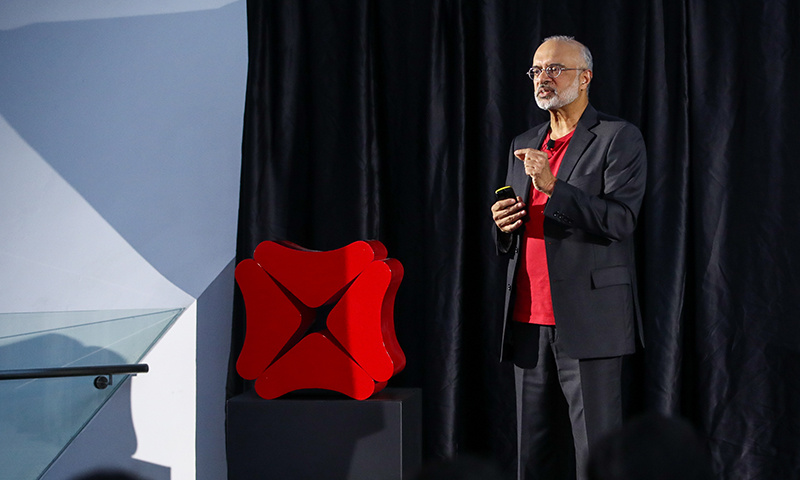Highlights from the three-day FinTech conference
The Singapore Fintech Festival (SFF) continues to be the biggest FinTech event in the world and the third edition, held in November 2018, sparked many insightful dialogues. If you missed it, don’t worry! We’ve put together the highlights from the three-day FinTech conference.
1. AI and data ethics
- Data localisation measures are on the rise globally. A major challenge is enhancing data connectivity while taking into account issues of data sovereignty. The key is to have consensus on the standards and regulations for data to flow across borders.
- Banks should have a data culture and a data governance model which allows for self-service access to data for everyone within the organisation. Real time access to reliable data is critical to ensure data-driven decision making across the organisation.
- A key risk businesses face is jumping into technology solutions without understanding the core problem and defining the expected outcomes.
- While one view of data privacy holds that customers should own their data and control it, expectations on data privacy differ across regions. With the growth of the internet of things and a more connected world, this could present opportunities for banks to manage consent for third parties to access data, which builds on the position of trust it has established with customers.
2. Ecosystems, platforms and partnerships
- More foreign financial institutions are setting up fintech innovation labs (e.g. Bank of China, Westpac, Deutsche Bank and PingAn OneConnect) in Singapore, bolstering the nation’s status as a regional and global fintech hub.
- The nature of competition has shifted from that of “fintech vs banks” to that between “teams of fintechs and incumbents” as seen in joint announcements by Gojek with DBS, Grab with UOB, and Razer with NETS.
- The Monetary Authority of Singapore (MAS) continues to play a significant role in fostering the SME/start-up ecosystem through talent attraction, investment injection and marketplace platforms.
- MAS launched MATCH (Meet ASEAN’s Talents and Champions), a curated deal-making platform that will connect global capital with the ASEAN enterprise community.
- MAS has also launched its private market programme, where MAS will allocate USD 5 billion as part of its investment portfolio into the private markets asset class. These funds will be placed with top global PE and infrastructure fund managers that are committed to deepening their existing presence or looking to establish significant presence in Singapore.
- MAS and the Info-communications Media Development Authority (IMDA) partnered to create a cross-border innovation platform for SMEs called Business sans Borders. It will enable SMEs to connect in a global services marketplace and allow solution providers to more effectively reach out to geographically dispersed SMEs.
3. Infrastructure (Cloud, APIs)

- Cloud-based services are central to data-related transformation. However, the biggest barrier to the transition to cloud is regulation although the latter is evolving in most places to enable better services.
- While some sovereign laws require citizens’ data to be stored within the citizens’ country, the elastic and global nature of clouds means there is a need to reconcile the loss of flexibility with adherence to law.
- As the bulk of interactions with public clouds are via APIs, every move is tracked and stored with a granularity that was not previously possible. This allows quick reaction to threats and breaches.
- A crucial step in preventing data breaches is ensuring data accountability, which involves first understanding the type of data then deciding whether it should be in the cloud. Correct data classification is thus crucial as moving data elsewhere will not protect against breaches or loss if such data is not governed upfront.
4. Payments and cash

- A key pain point in the payments sector is cross-border payments and settlement of assets. Cross-border payments involve multiple currencies and cross-border settlements involve multiple assets, but there is no single trusted central party to do this. Distributed ledger technology may thus present opportunities in this area.
- MAS and Bank of Canada have begun work on linking their respective blockchain platforms to explore the possibility of instant, 24/7 settlement of cross-border payments transactions.
- While payment platforms can scale across countries, regulations and infrastructure vary from country to country. A single tech platform would thus require different approaches for individual markets. This is made more challenging by the fragmented markets of Asia. Some firms have thus chosen to enter into local alliances, e.g. Singtel and AIS partner to offer QR code-based cross-border mobile payment between Singapore and Thailand.
- The growth of digital payments may result in greater digital lending as payments companies obtain more data for underwriting.
5. Blockchain/distributed ledger technology (DLT) and cryptocurrency
- Regulatory clarity is key in determining widespread blockchain technology adoption.
- A prudent approach is required in deciding whether to embark on DLT initiatives now or take a wait-and-see stance.
- Blockchain should be considered in terms of a broader conversation about the digitisation of the economy, as well as the other new technologies that are part of the fintech debate, such as AI, DLT, cryptoassets.
- MAS and the Singapore Exchange (SGX) have developed Delivery versus Payment (DvP) capabilities to settle tokenised assets across different blockchain platforms.
6. Financial inclusion
- Initiatives to promote inter-operability have to be scoped, timed, and executed appropriately based on the prevailing context of the society that fintech firms are serving. Implementing networks to offer interoperability can be costly and may present a setback to the industry if there is no real economic reason to do so.
- Providing monetary aid to the poor alone will not eliminate poverty. Rather, the poor should be empowered to participate in and contribute to the economy. However, they may face challenges in doing so if they are unable to perform simple financial transactions, have access to ATMs, or make payments through credit cards.

- For financial inclusion to be meaningful, it needs to address basic needs. The United Nations Capital Development Fund is working with partners to support the development of payments and remittances, and is focusing on linking employment with financial literacy.
- In less developed economies, credit service penetration tends to be low due to a lack of relevant data.
- An online global fintech marketplace and sandbox platform for financial institutions, the API Exchange (APIX), was launched by the ASEAN Financial Innovation Network as part of efforts to enhance financial inclusion in less developed markets.
7. Cybersecurity
- As cybersecurity products and solutions face shorter periods of effectiveness, from years or months to mere days and hours, it is important to simplify the cyber infrastructure to improve repeatability and recoverability, improve response times, and hasten change implementation.
- Cyber threats are increasing in sophistication - Deutsche Bank has seen malware with simple built-in AI that can learn and adapt from the network it was trying to penetrate, thus relying less on the traditional command and control type of communication with an external source.
- Timely information sharing and open dialogue on attacks and adversaries within the industry would allow industry players to pre-empt and fend off potential attacks. While threat exchange networks exist, having personal relations within the industry and across the hierarchy would enable a broader breadth and depth of information to be gathered.
- Banks need to be more active in using financial data to track crime. Just as tech firms leverage analytics to understand customers, and financial institutions can do the same to understand crime. Financial institutions can also learn from tech companies on how to effectively manage scalability and the risks that comes along with it.
8. Future of banking
- The key strength of banks is the trust they have built with customers. Considering the similarity between money and data, banks may potentially transition from managing financial assets to managing digital assets.

- The future of banking should involve customers embedding banking services into their lives. With the right use of data, product and services should be contextual and not be a product push.
- While the focus in banking was previously on becoming best-in-class in products and cross-selling, the focus has since shifted to innovation in customer experience.

 Hong Kong
Hong Kong India
India Indonesia
Indonesia China
China Taiwan
Taiwan






